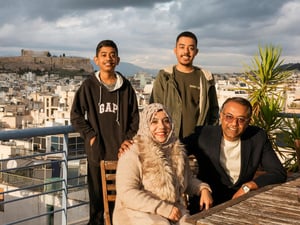Family reunification
The family is the natural and fundamental group unit of society and is entitled to protection by society and the State.
Family unity is a universal right. When forced to flee their home country, refugee families often experience painful separation. They may spend years without seeing each other, or even never reunite. States have a responsibility to protect and restore family life for refugees, including through family reunification procedures. UNHCR helps safeguard the fundamental right of refugees to family unity; we work to improve access to family reunification procedures and help to support separated refugee families.
Families belong together
Family reunification procedures are based on the legal right to family unity. Family is universally recognized as the fundamental unit of society. Its integrity is protected under international law and in binding regional legal instruments.
Unlike other third-country solutions such as resettlement, education and labour mobility, States have a legal responsibility to establish legal frameworks that enable families to reunite. Most countries have family reunification procedures for refugees based on these international obligations.
Well-designed refugee family reunification procedures can help establish safe and legal routes that can prevent refugees from resorting to dangerous and irregular journeys and risking their lives to reunite with their loved ones. Effective family reunification procedures can deter smuggling networks abusing the refugees’ need to join their families.
Reuniting separated families boosts integration prospects as united families typically adapt better in their new communities. Family members not only provide a sense of safety, especially for vulnerable groups like women, children and older people, but also contribute to economic self-reliance. Getting back together with family also helps refugees affected by conflict-related trauma to heal.
How UNHCR supports the reunification of refugee families
Family reunification is a State-managed procedure existing under the national legal framework of a country. The reunification of refugee families is first and foremost the responsibility of States.
UNHCR:
- monitors State compliance with refugee family reunification obligations
- continuously advocates for the adoption of flexible, protection-focused procedures in line with the limitations of their refugee situation
- supports families to access information and legal and administrative assistance provided by relevant partners and coordinates key partners to establish support systems for refugees.
To be eligible for refugee family reunification procedures, while the family member initiating the procedure must be officially recognized as a refugee or complementary protection holder by a State, the family members of such a recognized individual are also likely to have international protection needs.
Challenges in reuniting refugee families
In reality, several practical, legal, and financial barriers continue to prevent refugee families from being reunited. These include:
- Complex procedures: Family reunification procedures can be complicated and refugee families often lack access to reliable information in their first language.
- Financial barriers: Some countries impose application fees. Others set strict income requirements for refugees to demonstrate their ability to support their families.
- Short deadlines and long waiting periods: Some countries apply short application deadlines, which are missed by many who would otherwise be eligible. In certain cases, holders of complementary forms of protection may face additional waiting times before they are allowed to lodge an application.
After the application is submitted, waiting times are often long, some exceeding years, and result in extended separation of desperate families. - Differences in defining family: The definition of family varies between cultures and countries. Often family reunification procedures define a limited number of eligible relationships, excluding other relatives who may also be socially, emotionally, and/or economically dependent.
- Documentation challenges: Refugees often have difficulties accessing evidence of their identity or relationships (passports, birth or marriage certificates etc.)
- Embassy presence: Where there is limited embassy presence, family members may be asked to travel to neighbouring countries or regions for different stages of the application process. This can be dangerous and expensive, if not impossible, for them.
- Protection challenges: Often family members are refugees themselves. This means that when requested to approach the authorities of their country of origin to obtain documents, those families may be exposed to further risk of harm.
The Global Family Reunification Network
Launched in 2020, the Global Family Reunification Network (FRUN) is the first global platform devoted to family reunification for refugees and other beneficiaries of international protection. The FRUN draws together key stakeholders, experts and academics in the realm of family reunification with the collective purpose of promoting and facilitating greater access to family reunification procedures.
The FRUN is a closed network and prospective members would need to be approved upon consultation with the FRUN Advisory Group.
In the context of the Global Refugee Forum 2023, the FRUN mobilized diverse actors in support of a multi-stakeholder pledge aiming to reunite 1 million families by 2030.
If you’d like to know more, please contact [email protected] or take a look at our website.











